#historical book review
Text
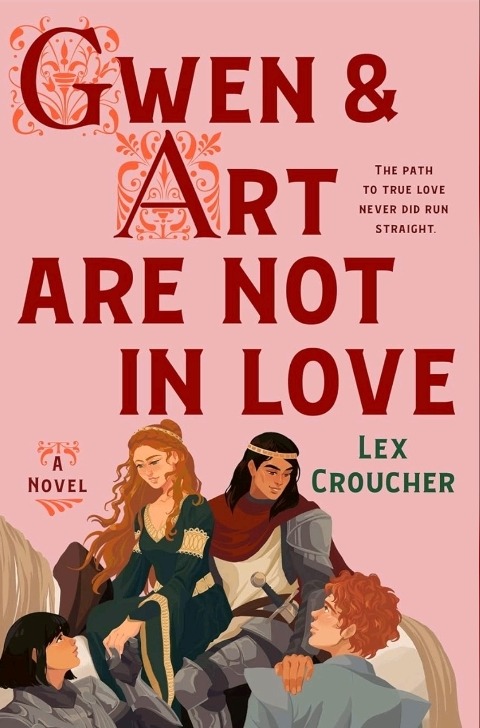
This was such a delight! Gwen is a princess at Camelot, years after Arthur Pendragon has turned to myth. Arthur is her betrothed. However, neither is looking forward to their future together because both are queer.
Gwen has spent years falling for the one and only female knight that takes part in the tournament every summer while Art is falling for Gwen's brother. This story is not only romantic but is full of meaningful moments. The dialogues, the banter, is so funny and enjoyable.
The ending completely surprised me. I thought this would never get too serious, but the ending is intense!
Out November 28, 2023!
Thank you, Netgalley and Publisher, for this Arc!
#book#bookish#books#bookworm#book review#currently reading#read#bookblogger#reading#ya romance#ya romcom#ya books#romcom#historical romance#lgbtq+#lgbtq books#lgbtqia#gwen and art are not in love#lex croucher
231 notes
·
View notes
Text
Well I’m certain the book is good but it’s no Publius Vergilius Maro’s Aeneid so is there even a point really
#TRYING TO BEAT MYSELF INTO READING MORE BOOKS THAN#a) literary reviews#b) historical fiction about Rome#c) historical history about Rome#mags babs#the pious and the furious
32 notes
·
View notes
Text

He is half of my soul, as the poets say.
The song of Achilles, Madeline Miller
#the song of achilles#tsoa#Achilles#patroclus#books#book diary#book review#reading#book#book aesthetic#book quotes#greek mythology#romance book#romance#historical fiction#madeline miller
37 notes
·
View notes
Text


Status: read
Rating: 5/5 🌟🌟🌟🌟🌟
I am a Weyward, and wild inside.
Simply in awe. Weyward by Emilia Hart has stolen my heart and is easily my favorite read of the year. Weyward is a beautiful historical fiction tale with themes of witchcraft, nature, womanhood, and gothic horror, this story delves into the lives of three women throughout scattered periods of time. Altha's story takes place in 1619, Violet's takes place in 1942, and Kate's takes place in 2019. Each woman's story is as captivating as the next.
As I was finishing Violet's chapter regarding her mother and her family's history, I began to tear up, I flipped the page to the next chapter and I stumbled upon a beautiful white feather. I began to sob. My boyfriend had gotten me this book from a second-hand online shop and the previous owner must have left it in there. I felt like the feather was fantastically symbolic of what I was feeling and I felt so connected in that moment to myself, to nature, and spiritually to those in my life who have passed.
Could not recommend this book enough 🪶🌿🪲🐦⬛
#Weyward#emilia hart#book reviews#book review#booklr#bookblr#books#books & libraries#book blog#bookreviews#witchcraft#witchblr#green witch#green witchcraft#weyward witches#historical fiction#herbalism#familiar#familiars#witches#magick#witchcore#witch#woods witch#witcherature#gothic horror#horror books#horror#weyward sisters#wayward sisters
27 notes
·
View notes
Text
The Lady Serena review

I think, quite possibly, this was the first ever historical romance I’d ever read. Little did I know that it was written by Virginia Coffman— yes, THE Virginia Coffman, Gothic novelist extraordinaire, who was to become one of my favorite authors. In the late 1970s, under the pseudonym of Jeanne Duval, she wrote two historical novels set in ancient Rome, specifically against the reign of the Emperor Nero. I was so obsessed with this book, I read it over and over and over again. Years passed, and I lent it to a friend, who was much less enthused about it than I was. Then I read other negative reviews, and I began to think this book wasn’t so hot, and I was viewing it through rose-colored Nostalgia Goggles. Had the suck fairy come for Lady Serena?
Anyway, at last I decided to sit down and reread it. The back copy sells it as a lurid bodice-ripper about a Vestal Virgin, Serena, who has a forbidden romance with Tigellinus, Nero’s dark and sinister prefect of police. It definitely has bodice-ripper elements, but compared to many romances of the time, like The Flame and the Flower or The Wolf and the Dove, it is a masterpiece of subtlety and nuance.
Serena, a proud, practical aristocrat who’s taken vows as one of Vesta’s sacred priestesses, is increasingly tempted by Tigellinus’s masculine charms as she finds herself pulled into palace intrigue— specifically, she is called to tend to a sickly Emperor Claudius, who dies shortly after, from a surfeit of poisoned mushrooms or… possibly something else? Soon, she’s caught up in a shadowy conspiracy and a power struggle between the impulsive, lovable but erratic young emperor Nero, and his competent and frightening mother Agrippina. The depiction of these historical characters is so good, so assured and so accurate, and so free of the usual nonsense from Suetonius, it’s as if Coffman had actually met them. It’s impressive work.
The first half of the book has this languid, beautifully written atmospheric slow burn going on, which is very typical of Coffman— but the ending is exciting and cinematic, complete with battles at sea, riots, chariot chases and a gripping palace showdown. As for Tigellinus, the hero— he’s fine. He felt a bit undercharacterized— I felt that he and Serena needed a few more scenes together, but given how abysmally low the standards of romance heroes from the 1970s were, I didn’t mind him. The sex scenes are pretty short and not especially detailed, but that also seems pretty typical for the time. I did not especially buy the romance at first, but I felt much more convinced by the end, after the couple had been on the run together (which is always one of my favorite tropes).
As for Serena, at first I found her underwhelming, but I grew to like her a lot. She’s pretty naive at first, but over the course of the book she proves herself to be tough, clever, observant and in some respects, ruthless— she fends off two attempted rapists, and towards the end she coolly rescues herself from a particularly sticky situation in a way that had me pumping my fist into the air. I found her arc satisfying. She does have a lot of internal conflict, about betraying her religious vows for a relationship with a man; but she still loves and reveres Vesta. How can she reconcile these two parts of herself? The senior vestal priestess, Lady Maxima, plays a key part too: it’s great to see an older woman play a major part in a historical romance, and I loved seeing how her and Serena’s relationship developed. I thought it ended in a rewarding place— and I don’t want to spoil too much more! But yes, this aspect is definitely something I could not have appreciated as much as when I was a teenager.
The Lady Serena is also interesting in that it walks a fine line between historical-novel-with-romantic-elements and historical romance proper, which I liked. There’s a lot of Gothic elements too— misty temples, flickering torches, ominous villas and cabals of sinister senators abound— which I found to be a treat. This approach is so unusual for this setting. Also, the fact that the author is really affectionate towards Rome as a place and a culture really stands out, and the research is mostly well done.
As for the downsides, the writing is lovely, but there are some repetitive bits that could have been trimmed. Some of the plotting also can feel a bit redundant. For example, there’s two attacks (one on Serena, and another on Tigellinus) by two separate guys who lost all their money betting on some sports event and who became deranged as a result. Once is fine, I guess… but twice? Really? There’s also a few typical Roman tropes that came from old movies that have since been debunked, like galley slaves (not a thing until the early modern era), or people using chariots to travel from one place to another (they were only for races and ceremonial use, not for ordinary use). There’s also all the borked nomenclature, but that’s so typical of 90% of ancient Roman romance out there, that my eyes skim over it at this point.
Anyway, even with all that said, I love this book, and I recommend it! It’s an engrossing Gothic epic set in the ancient world with a cool and competent FMC, a respectable hero, a vibrant supporting cast of characters, and some incredible action. Sadly, there’s no ebook of this available, but paper copies abound, and the curious can find it on archive.org.
#book review#ancient rome#historical romance#virginia coffman#book reviews#emperor nero#agrippina the younger
34 notes
·
View notes
Text

Thanks to the publisher for providing me with an ARC in exchange for an honest review
✩🗡️🥀Review:
A dark, tragic, and haunting reimagining of Shakespeare’s most famous villainess.
“Lady Macbeth” follows Roscille after she is wed to a Scottish brute, who does not leave his warrior ways behind when he comes to the marriage bed. To survive his hostility and dangerous court, she relies on her wiles and hidden witchcraft.
I am quite the Shakespeare fanatic and “The Tragedy of Macbeth” is one of my favorite plays precisely because of how cunning and ruthless Lady Macbeth’s character is. I gravitated toward this novel because I was curious about Reid’s take on the character and though this is not the play retold from her point-of-view, I enjoyed it for what it is! Reid’s reimagining gives Lady Macbeth her own name, a past, and occult power that cleverly expands on Shakespeare’s original work. In Reid’s rendition, she captures a woman living in a patriarchal society who has her voice violently taken away by the men around her. Roscille’s fear surrounding abuse at the hand of men is what fuels her scheming and manipulation—what ultimately turns her into Lady Macbeth. She doesn’t want a crown, she wants to survive. She uses her beauty as a weapon in retaliation against those holding her womanhood against her. She finds power in her rage, which she acts on only after it has festered. I think that is the key difference between Roscille and Shakespeare’s Lady Macbeth—in a world that does not favor women, she is less ambitious and more reactive in a sense. This new portrayal took some getting used to, but once I did, I appreciated how it widened my perspective.
I was entranced by Reid’s atmospheric and lyrical writing. The intention and power behind each and every word adds depth to Roscille’s character, showing the extent of her wiles and smarts. The bits of proverbial wisdom Reid sprinkles throughout allow her to emulate the bard himself in her own way. What I love most is how Reid uses various names for each character to reflect the different languages being spoken at the time.
➾ NOTE: After careful reflection and reading reviews written by my peers, it has been pointed out that this book can be interpreted as xenophobic. Intentional or not, most, if not all, of the Scottish characters—an ethnic group that Roscille does not belong to—are underdeveloped and described as brutish, violent, and evil. This characterization is unfair and in no way pays homage to the source material.
Cross-posted to: Instagram | Amazon | Goodreads | StoryGraph
#booklr#book blog#book blogger#bookish#book review#bibliophile#book rec#bookaholic#bookworm#lady macbeth#ava red#roscille#adult fantasy#historical fantasy#historical fiction#horror books#morally grey characters#paranormal#shakespeare retelling#retelling#adult romance#book reader#adult books
20 notes
·
View notes
Text


"A Year Down Yonder" by Richard Peck
This and the one before it are hilarious! Highly recommend! The third book just had me sad, so I don't recommend the third. But this and the first one are fantastic! 😊
QOTD: Who is your favorite Gravity Falls character?✨
Answer: Grunkle Stan for me! 🤣
#funny books#fun books#feral women#wild woman#crazy grandma#historical fiction#the great depression#great depression#grandma#grandmacore#morally gray#morally gray characters#morally grey women#middle grade books#newbery award#short books#quick read#grunkle stan#gravity falls#a year down yonder#richard peck#book recommendations#book#book rec#books#book review
20 notes
·
View notes
Text
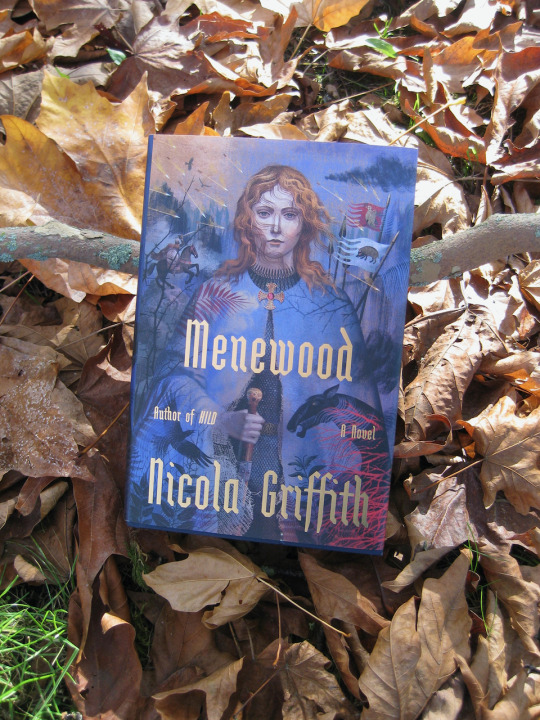
I waited ten years for Menewood and it was well worth it. The period details, the quiet moments, the portraits of daily life interspersed with epic moments, the way the politics and intrigue were portrayed, it was all as good as Hild, if not better.
Menewood picks up a few months after Hild ends and follows Hild's first few years of young womanhood. (So if you haven't read Hild, I suggest you do so. There's a lot of context and character you'll be missing otherwise.) Hild might have survived the politics and battles of her childhood, but that doesn't mean that the politics have ended, or that she'll survive the next peril. It's only a matter of time before there's another war, after all, and it's her responsibility to keep her and her own safe through it.
Griffith does a wonderful job balancing the tenseness of the greater story with the realities of daily life and personal lives. Food has to be harvested, buildings need repair, relationships need strengthening, travel often involves hours or days of horseback riding through countryside. It's rich and detailed (and makes for a slow read) but that also lends to the tenseness in its own way because you can see what's at stake and you know the sort of things that are likely coming.
Griffith also doesn't shy away from the fact that organizing an estate, navigating court politics, having a good marriage, and trying to avoid a war is a lot of pressure for an eighteen-year-old, especially one whose childhood was full of similar tensions. I was glad she made this part of Hild's story, because it lends another level to the character and makes explicit some things that often get glossed over both in the stories we tell of medieval life and those we tell about ourselves now. Seeing Hild grow into her own as an adult was marvellous.
Honestly, there's very little about this book I didn't like. The secondary characters are as vibrant and finely drawn as Hild herself. Griffith's writing is strong on a technical level and it's clear she's done an impressive amount of research. She's as good at a fight scene as she is at writing a feast or a forest walk. Watching Hild work out politics and what's coming is a lot like watching a master detective solve a mystery—you have all the clues too but she sees how they fit together.
I'd forgotten how much I enjoyed Hild until I started reading Menewood, actually. (Ten years will do that.) Then it was "yes, this book, this book is good, why am I the only person I know who's read it?" Please, I'm begging you, read these books if you like great historical fiction, if you like epic fantasy*, and especially if you enjoy both genres.
And if I have to wait another ten years for the end of the trilogy, it'll be worth it too.
* no, it's not fantasy, there's no magic, but it's not like Game of Thrones has a whole lot of that either.
#book reviews#book recommendations#historical fiction#menewood#nicola griffith#read in 2023#my photos#book covers#adult booklr#booklr#bookblr
70 notes
·
View notes
Text
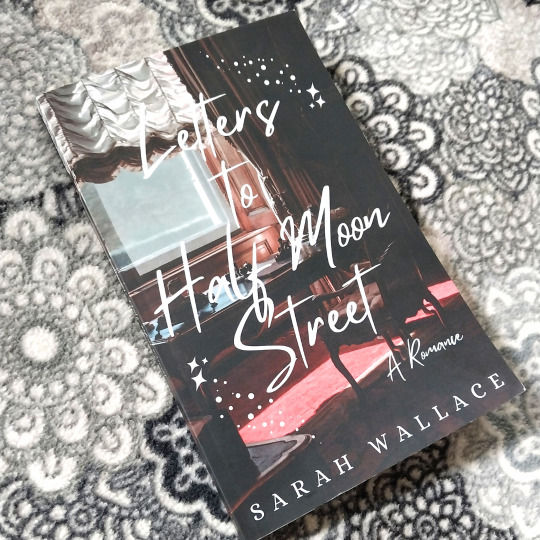
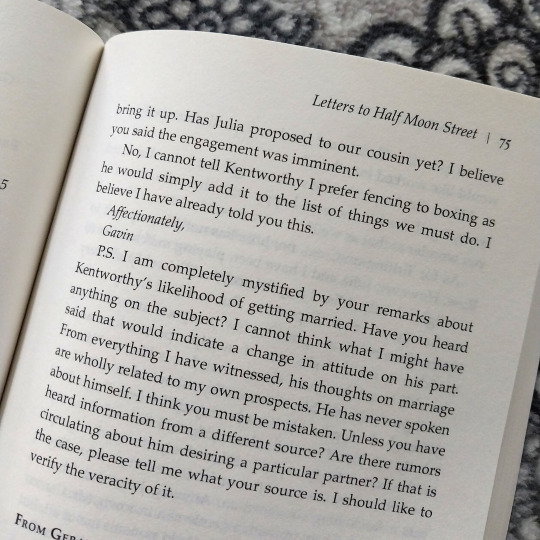



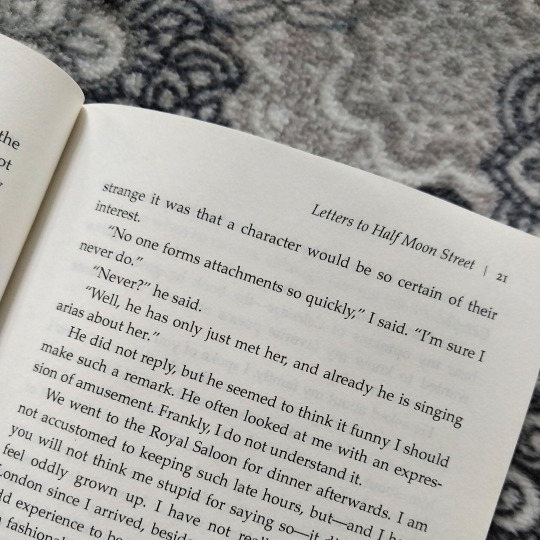
Letters to Half Moon Street by Sarah Wallace
Queer. Cozy. Comfort. Truly a book that puts the romance in romantasy. Reading this felt like sinking into a hot bubble bath. A wonderfully immersive experience with some delightful surprises.
For those who enjoy…
historical fantasy
queernormative worldbuilding
hurt/comfort
First in a series and I cannot wait to read the rest.
(Also, guess what? The ebook is permafree!)
#gay romance#historical romance#mm romance#mlm romance#queer romance#regency romance#historical fantasy#book review#romantasy#letters to half moon street#meddle and mend#sarah wallace
34 notes
·
View notes
Text

Honestly? 100% accurate. This may not be the most rave review my book has gotten so far, but it's definitely one of my favorites. Read the whole thing here.
#the shabti#ghost stories#historical fantasy#queer fiction#2024 debuts#ancient egypt#lgbtqia books#writing community#supernatural thriller#my art#goodreads review#hermann goschalk#gay character#jewish characters#m/m romance
42 notes
·
View notes
Text
"The Spirit Bares its Teeth" by Andrew Joseph White
Silas Bell, a young autistic transgender man living in the 1880s in England, wants to be a surgeon. Not a wife and mother. After a botched escape from a future devoted to a husband, he is diagnosed with “veil sickness,” a disease that causes violet eyed women to open the veil and communicate with the dead, an act that is illegal for women to do.
He is sent to Braxton's Finishing School and Sanatorium and engaged to a wealthy lord's son. But Braxton might not be what it seems. And Silas is the only one who can save the life of his new friends by uncovering the secrets of the school, all while fighting the voice in his head telling him to just do as he is told. For Silas, doing as he is told is not an option.
Andrew Joseph White has crafted an incredible story. All of the characters are complex and every character has so much depth. White is able to balance the main character, Silas, with all aspects of his identity. They are all woven throughout the story in an authentic way that gives him personality outside of those defining traits while still acknowledging how important they are. It is one of the best representations of autism I have ever read.
The setting and accuracy to historical detail makes the stakes seem real and send you to the time period. He uses the time period to bring light to the story he wants to tell. His use of imagery is terrific.
White is able to discuss so many important topics throughout the book, all of which apply in some way to our society today. He somehow is able to highlight and tackle each complex theme in one book while giving them each the space to be recognized for their individual importance.
Gory and dense while also romantic, The Spirit Bares its Teeth is an amazing novel with an incredible message to fight for your life and happiness, even if the whole world is against you.
#the spirit bares its teeth#andrew joseph white#bookl#booklr#book#book review#book blog#books#bibliophile#reading#ficiton#historical fiction#murder mystery#horror#dark#dark academia#dark fantasy#fanta#fantasy#lgbt#lgbtq#lgbtq book#lgbtq books#trans#transgender#transgender books#autism#neurodivergent#queer books#young adult
31 notes
·
View notes
Text
“To smile with your eyes, you must perforce know how to love.”
― Anton Sammut, from the historical novel Memories of Recurrent Echoes
#relatable quotes#inspiring quotes#inspirational quotes#life quotes#bibliophile#book blog#book quotes#bookish#books & libraries#bookworm#books#book review#quoteoftheday#quotes#book quote#life quote#beautiful quote#literature#bookblr#booklr#books and reading#love quotes#love#novel#literary fiction#romance novels#historical fiction#germany#bavaria#Anton Sammut
26 notes
·
View notes
Text
Supernatural Romance and Historical Fiction in Deborah Harkness's Shadow of Night
Why didn’t I read Shadow of Night before? I don’t know why I stopped at A Discovery of Witches the first time I read it because Deborah Harkness’s Shadow of Night is incredible. Not only do we get a continuation of a truly astounding series, but the historical setting gives everything and more. I couldn’t be more blown away by the power of Deborah Harkness’s writing.
It can be tricky writing a…

View On WordPress
#a discovery of witches#adult book recs#adult fantasy#all souls trilogy#book review#dark academia#dark academia books#dark fantasy#deborah harkness#diana bishop#diana royden#fantasy book recs#historical fantasy#Historical Fiction#historical fiction book recs#historical romance#matthew clairmont#matthew royden#school of night#shadow of night#supernatural fantasy#the book of life
12 notes
·
View notes
Text









read with saumya <3
When He Was Wicked ; by Julia Quinn
★★★★☆ out of ★★★★★
( read: 4.5 stars out of 5 )
REVIEW:
absolutely loved this book omg!!! hands down one of the best regency romances I've read, such good writing and definitely the best bridgerton novel.
the love michael has for francesca is so deep and so gutting its impossible to even imagine him with anyone else. and how fran's feelings transform from thinking him as a friend to someone she can't keep his hands off of to someone she's absolutely in love with is beautiful ❤️❤️
their love and guilt for john is so present and so realistically portrayed, loved it!! the love scenes are also something else in this one like wow damn🤭🤌🏼
i loved the dynamic between violet and francesca, it was so🥺❤️ especially in the second epilogue❤️❤️❤️
i do have a few problems tho, I didn't like the implication that michael is pretty clearly a colonizer, like I think that couldve been easily omitted idk why its kept in😭
i wish we couldve seen more of when michel fell in love with fran, maybe one or two flashback chapters?
other than this i really love this book!! sm better than the other parts haha
and so good it pulled me out of my reading slump WE'RE BACK TO FINISHING A BOOK IN A DAY WOOHOO (tho i wish i didnt start in the middle of exams lmao)
as for the adaptation, i have hope for michaela and francesca even tho i feel like the entire plot will most probably have to be changed, and i love michael v dearly so it would be a little sad to not see him on screen. but the books will always exist and we can just view the two as different pieces of art <33 (hoping, wishing, praying they do this with eloise's storyline as well)
In every life there is a turning point. A moment so tremendous, so sharp and clear that one feels as if one’s been hit in the chest, all the breath knocked out, and one knows, absolutely knows without the merest hint of a shadow of a doubt that one’s life will never be the same. For Michael Stirling, that moment came the first time he laid eyes on Francesca Bridgerton.
Where’s that new earl of yours?” My, she was blunt. “He’s not my earl,” Francesca pointed out. “Well, he’s more yours than anyone else’s.”
Why? It’s because I love you, damn me to hell. Because I’ve always loved you. Because I loved you when you were with John, and I loved you when I was in India, and God only knows I don’t deserve you, but I love you, anyway.
This thing between them, this bond—it wasn’t just passion, and it wasn’t wicked. It was love, and it was divine.
Thank you, Michael, for letting my son love her first.
#bridgerton#bridgerton spoilers#when he was wicked#francesca bridgerton#john stirling#michael stirling#book review#literature#literature moodboard#historical romance#regency books
18 notes
·
View notes
Text



Book Review of A Crane Among Wolves by June Hur (허주은)
Summary: Hope is dangerous. Love is deadly.
1506, Joseon. The people suffer under the cruel reign of the tyrant King Yeonsan, powerless to stop him from commandeering their land for his recreational use, banning and burning books, and kidnapping and horrifically abusing women and girls as his personal playthings.
Seventeen-year-old Iseul has lived a sheltered, privileged life despite the kingdom’s turmoil. When her older sister, Suyeon, becomes the king’s latest prey, Iseul leaves the relative safety of her village, traveling through forbidden territory to reach the capital in hopes of stealing her sister back. But she soon discovers the king’s power is absolute, and to challenge his rule is to court certain death.
Prince Daehyun has lived his whole life in the terrifying shadow of his despicable half-brother, the king. Forced to watch King Yeonsan flaunt his predation through executions and rampant abuse of the common folk, Daehyun aches to find a way to dethrone his half-brother once and for all. When staging a coup, failure is fatal, and he’ll need help to pull it off—but there’s no way to know who he can trust.
When Iseul's and Daehyun's fates collide, their contempt for each other is transcended only by their mutual hate for the king. Armed with Iseul’s family connections and Daehyun’s royal access, they reluctantly join forces to launch the riskiest gamble the kingdom has ever seen:
Save her sister. Free the people. Destroy a tyrant.
Review: [Cruel tyrant is not an exaggeration so there is a content warning in the author's note that indicates the following: rape (mentioned), sexual abuse, misogyny, kidnapping women and girls, sex trafficking, incest (mentioned), violence, murder, animal cruelty, suicide (mentioned), infanticide (mentioned), psychological trauma, and panic attacks.]
Though this story is fiction, the setting and King Yeonsan are part of actual history. June Hur has not tidied up his tyrannical behavior so there are a lot of atrocities to witness in Iseul and Daehyun's path. This does make for a difficult read, but there is also love and strength that shine through. The dedication says, "To those who have dared to be a beacon of light in the bleakest of moments." There are numerous characters who are that light for others and even in the midst of so much awfulness, there is hope. That's what kept me reading.
Iseul's life has turned upside down and she has realized that she had taken her sister for granted. She is out on her own for the first time and is making brave and rash decisions because she seemingly is unaware of how truly risky and deadly her choices might be. Watching some of her actions is hard, but as she stumbles and begins to find her feet, she is also making connections with some folks who are those beacons of light.
It is equally troubling to watch Daehyun make decisions when there really are no actions to choose that feel truly right. My heart was with both of them knowing that they really were doing the best with their circumstances even when there were no good options. And even when they pick a way that seems best, there is endless frustration as they continue to face horrifying loss and disappointment. Many characters in this story, in addition to so many Korean people in that time period, dealt with a feeling encompassed in the word han. In the book it's described as the "feeling of outrage, the vicious urge for vengeance to right the wrong, pierced by the acute pain and grief of knowing our overwhelming odds at ever claiming justice."
Yes, the odds seem overwhelming, but Iseul, Daehyun and their allies continue to fight, sacrifice, and are willing to give their all to try anyway. They are all inspired by the Korean people, their families, loved ones, and the hope of creating a more peaceful place for all. Some of these allies are so wonderful and even though they are side characters, they managed to worm their way into my heart too. In the midst of all of the effort of so many people, there are also intrigues and mysteries to puzzle out so it's definitely a page turner.
Recommendation: Get it now. For those who watch historical K-dramas already, this will definitely be a must read. For others, this will appeal to anyone who enjoys history with some romance and political intrigue. Though it shows a lot of trauma and hardship, June Hur also provided characters that will touch hearts and stay with readers for a long time to come.
Extras:
youtube
Publisher: Feiwel & Friends
Pages: 368
Review copy: Digital ARC via publisher
Availability: On shelves now
21 notes
·
View notes
Text

The Stone Home by Crystal Hana Kim is a historical fiction novel about the 1980s reformatories in South Korea that took in "vagrants" to keep them off the streets, leading to prolific, state-sanctioned violence and horrific abuse, all to keep Seoul presentable for the ’88 Olympics. Our two main characters are young, rebellious Eunju Oh, who came in with her mother, and the strong, physical Sangchul, who focuses all his energy on protecting his more intellectual brother. They both will have to face terrible decisions if they want to survive without internalizing the violence themselves.
This novel edges on being too bleak. Its topic is horrific, so it's hard to fault that, and it was a tough week for me to dive into a bleak story like this one, which probably impacted my opinion. I think perhaps Kim's occasionally over-wrought writing extended this bleakness—left unsure about what happened, I'd have to either reread or just assume the worst.
Still, the novel is an effective, hard-hitting look at psychological, emotional, and physical violence and the impact they have on us all, but particularly young minds. The suspicions, betrayals, that they sow—the growing need to either internalize the violence or redirect it at someone else to save yourself. It shows, unapologetically, what it might take to survive something like that place, the withdrawing, partitioning, imagining, competing that results. The novel is painful but rich in its tragedy. Just remembering, recording, is a victory: South Korea only acknowledged the existence of these reformatories officially in 2022.
Content warnings for torture, body horror, violence, psychological and physical abuse, sexual assault, trauma/PTSD.
22 notes
·
View notes